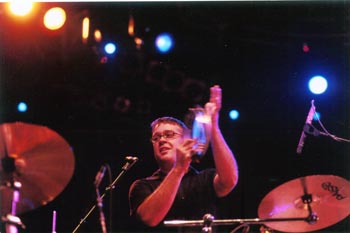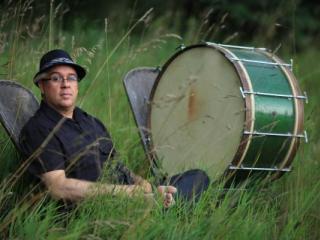Roberto Rodriguez and the Cuban Jewish All Stars @ 13th Washington Jewish Music Festival, Jewish Community Center - May 14, 2012.
Tonight was where traditional Jewish music met traditional Cuban music with plenty of other influences from an all star band that hail from various corners of three continents and an island. I was expecting a good melding of klezmer melodies with Cuban rhythms with an overall jazz feel. On the simplest level, the sold-out crowd got every bit of that and then some.
Rodriguez plays a drum kit that looks recognizable, but had a few twists. He had his left foot on a pedal with a cowbell and no hi-hats. He used plenty of ride cymbal and mixed his style of kit drumming and world beat percussion. His partner was on congas and their interplay was brilliant. Add the bass playing of the former player from the Tito Puente band and the rhythmic foundation was playful and rock solid.
The rhythms were mostly 4/4 from what I could gather, but the three of them certainly maneuvered in complex patterns within the measure. The lead players were violin, clarinet, flute, and piano. The piano was the only instrument that did not quite cut through in the mix. But when the player switched to the accordion for a couple of songs and organ for one, he was loud enough and the playing was solid.
His piano solos were clear, although he had fewer than the three people on winds and violin. The winds were effective and had an eerie quality as they were not overpowering. The clarinet player from Argentina occasionally captured that snake charming magic reaching my inner cobra. The Japanese woman from NYC on the violin had more than enough power for this band as her playing really cooked all night long.
The jam packed crowd was loving it all night long and the dancing in the aisles steadily increased all night. The venue reminded me of the Scottish Storytelling Center in Edinburgh, which helps virtually no one picture what I am talking about. Basically it was a sharply tiered seated hall that fit around 260 some people.
Roberto Rodriguez was enthusiastic and a great host. He leaped up at the end of one song and talked about his passion for the combination of Jewish and Cuban music. Early in the set, the music sounded a bit more klezmer, while later on it veered more toward Cuban jazz. But there was much more going on well beyond my simplistic descriptions. It was their variation of rocking jazz with Rodriguez playing well and pointing to soloists and doing the jazz version of conducting.
They played 90 minutes of mostly instrumental music with some vocals in the last few songs from the three in the rhythm section (conga player doing more of the lead work). Simply, this was every bit as fun as I expected it to be. At worst, I figured it would be a great set of rhythmic music from skilled players. But at best, I expected to be intrigued with a few different musical forms working together, which is exactly what happened tonight. It certainly kept my mind working, but the toes were tapping, the hands clapping or tapping virtually the whole set.
This is yet one more example of the fusion from sounds south of the US working with structures closer to home or in Europe and coming out in an exciting manner. Music lovers everywhere should be checking out the several acts that do this well, and those lists need to include Roberto Rodriguez.
Interview with Roberto Rodriguez
David Hintz: So a few quick questions for you before your Washington DC appearance at the Jewish Music Festival. I see that music was a family tradition for you. But has it always been a personal calling for you? How early did you get started?

Roberto Rodriguez: Well, it started from my Father, who taught me the music. And from there on it just involved in many ways. In Cuba, it had a double meaning. One was music and the other was just to stay at home more, to stay more musically aware, with all the turmoil that was going on, being in a place that was not stable. That was a blessing, but kept me at home a lot. It is interesting in retrospect I can remember being around instruments, musicians, etc. My father was very involved in teaching in Cuba, so he would take me everywhere. Then of course coming over to the US opened up a whole new world.
Right, and what year was that?
That was actually 1970. And that was just amazing. My father was just buying old records and saying this is the greatest musician in the world--Louis Armstrong. Just all kinds of ramifications... it was just a real longing for what we were at times prevented from having in Cuba. So this was a backlash, a good backlash. Musicians were coming in and out of the house all the time and eventually I ended up with a drum set. Then it was from violin to piano to trumpet and eventually yes, the drums. And musically it all started with blues to rock to jazz-rock to everything... to Yiddish Theater at 15 to Jewish weddings... bar mitzvahs, partied, night clubs. I started early at age 14.
You're actually headed toward my next question, did the branching out from a Cuban heritage happen when you came here?
Well, if you really want to look at it, it is kind of the opposite. It was actually classical music early on. And then, the music of my father was Cuban music. So then in Miami, it was a bit more where I was turned on to rock and jazz... all the bands I was playing in where more pop and jazz and rock. Jewish weddings were just normal work down there. So it was pretty much a calling later on, but then you know jazz was always at the forefront. We were always attuned to what was happening there. Actually I got into the University of Miami on scholarship for the jazz program and that was my first love.
And jazz seems more welcoming. I have some background in the folk movements in both Great Britain and the United States. In the sixties, there were traditionalists that did not like a lot of the musical changes. Have you ever encountered anyone that had problems with you crossing over into different styles?
No. Originally they both connect in the big band form and the arrangements. A lot of music was coming into the US from Cuba, but they were getting like the forties and fifties Big Bands were coming here. It was just a back and forth--how can you avoid it? We're only 90 miles away. So the influences in many ways are reciprocal. We were both gaining from each side. The passage of records coming in from Cuba was a big deal. So, it always made sense to me to keep exploring and investigating and just try to check out what is out there. It is basically a journey that is still going on. It eventually got me to New York after I had done the pop scene in Miami, the Miami Sound Machine, the Julio Iglesias, and that kind of stuff. Knowing then, I planned to find myself as a composer and go into the multicultural aspects of putting things together. That was what I was longing for... how to connect people with different cultural talents and not shun them out because it is not jazz or not rock. Jazz is a real tool for that. And blues... I have connected from Hank Williams to you name it. It is just music. It's all music. The similarities are amazing and the differences are even more amazing (laughter). You know, I've worked with John Zorn and others and have been able to explore. I wasn't aware of it, but I was in a passageway to making music that some how connected to people and that have lead to new project debuting at the Lincoln Center.

Sounds like you have multiple projects going on?
Yeah, I do have multiple projects going on, but in this sort of vein, I have new orchestra called Orchestra Faravia, that I named after my grandfather. It is basically a group of artists that have come from different places and all live in Brooklyn now. They will be debuting this month and is another New York project that has come together. Just more of that dynamic talent that is here, and I just wrote some music and am covering other music and I'm just trying to shoot the arrow... It's tricky, with even some of the Cuban players, eventually they go 'wow, this music is pretty cool, this Jewish music thing'. Everything is pretty cool if you put your head to it and you really work hard and do it. You come up with something. This new group has Arabic musicians, Cuban musicians, Jewish musicians, Greek and we all play with each other in different bands. That is the approach I am on now with projects on a multicultural level. Most of my projects involve that, like one with my wife as well. I enjoy playing all over the world with this.
Well I look forward to seeing your show. I was always try to encourage people to branch out more and I think it is great with what you are doing by combining different things and exposing audiences to different music.
You know David, about ten years ago Joe Jackson asked me to play with him. He's a really incredible talent and he's got this thing for Latin music and it's passion. That's it, you have got to have passion and you can do so much. It is incredible. He was so kind, talented and open, generous... And that opened my mind in the last ten days that this is all possible, you can put it together. Others may put it out in a plastic bottle, and you go to the river and it's there. It has been a blessing to have this incredible spectrum of music.
And it is our blessing, too. Thank-you for your time.
First published & full interview @ dcrocklive.blogspot.com.
Photo Credits:
(1)-(2) Roberto Rodriguez (unknown).